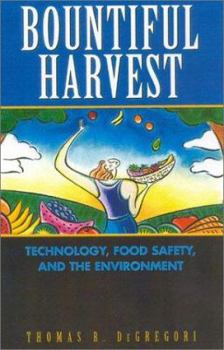Bountiful Harvest: Technology, Food Safety, and the Environment
A critique of the modern Greens, vegetarians, organic and natural food advocates, and critics of genetically modified foods.
Format:Paperback
Language:English
ISBN:1930865317
ISBN13:9781930865310
Release Date:September 2002
Publisher:Cato Institute
Length:262 Pages
Weight:0.85 lbs.
Dimensions:0.7" x 5.9" x 9.0"
Customer Reviews
3 ratings
A very highly recommended, fact-filled primer
Published by Thriftbooks.com User , 22 years ago
Bountiful Harvest: Technology, Food, Safety, And The Environment by Thomas R. DeGregori (Professor of Economics, University of Houston) is a thoroughly "reader friendly" introduction and analysis of how modern technology has drastically affected our environmentally based, technology enhanced food supply. Exposing myths and presenting extensive, meticulous research on the history of pesticides, pollution, organic agriculture, and much more, Bountiful Harvest is a very highly recommended, fact-filled primer, which will provide the non-specialist general reader an invaluable instructional background with respect to what really is served up on the dinner plate.
DeGregori Makes "Bountiful" Sense
Published by Thriftbooks.com User , 22 years ago
Radical environmentalists and nature-first types beware! Dr. Tom DeGregori dares to controvert your bluster, and has the courage not to "think small." DeGregori, a Professor of Economics at the University of Houston Central Campus, has long played the "Devil's Advocate" to Barry Commoner's "Runaway Technology Thesis." For a minimum of thirty years, he has steadily proffered logical counterpropositions to the knee-jerk anti-science of modern ecological Luddites.In his wonderful new book, aptly entitled BOUNTIFUL HARVEST: TECHNOLOGY, FOOD SAFETY, AND THE ENVIRONMENT, DeGregori carefully integrates human evolution, reason, art, writing, and manufacture as the prerequisites and components of technology. As he has done elsewhere, DeGregori once again promotes the humanity of technology, which is both a phenomenon and process, in defiance of those who would spurn it as a materialistic vice. Early on, he declares that without technology, we pitiful humans would have had to adapt to our environments "by the much slower adaptive process known as speciation [the evolution of different species]." Technology, which is unique to the human species, saved us eons of evolution and gave us to ability to maneuver and develop throughout the world. DeGregori reminds us that anti-technology evolved "with, and probably before, Plato," who argued that with the creation of the alphabet (and writing), the young would be urged not to rely on their own memory. This in turn founded a viewpoint that we, as humans, somehow "lose something" with every technological advance. He unmasks the insanity (and inanity) of such sophistry in his chapters on food safety, where he cleverly refutes the would-be superiority of "organic foods." Indeed, we created artificial substances to fend off the very toxicities and incapacities, which organic farming reintroduces. The author boldly asserts that a return to purely organic farming might feed one-fifth of the current world population, involving farm output losses of 53 to 100 percent. Moreover, organic fertilizers often are accompanied by graveolent diseases that have been long since stymied, or eliminated, by technological countermeasures. DeGregori is best when he scoffs at the "whole foods" fad, which encourages well-to-do (and well-fed) customers to buy potentially fecally contaminated foods at a 57 percent mark-up!The fact is that human beings never have, and never will, live in "harmony" with nature because "by nature" humans must transform or, at the very least, disturb environments to make the regions habitable. Without technology, our physically inferior species could only survive in tropical or, at best, subtropical environments. Even the simplest of farmsteads, say, a swidden plot, at least temporarily clears natural vegetation to make way for crop cultivation. The fact is that it is only through the implementation of suitable technologies that humans can minimize the disturbance and the dangers to themselves and their environme
an excellent defence of agriculture and biotechnology
Published by Thriftbooks.com User , 22 years ago
Thomas R. DeGregori knows his food technology. A professor of economics at the University of Houston, DeGregori has written an excellent defence of modern agriculture and biotechnology.I would recommend this book as an antidote to the frightening biotechnology-gone-mad scenarios painted by organisations such as Greenpeace and Friends of the Earth.This book is a welcome addition to the biotechnology debate.





